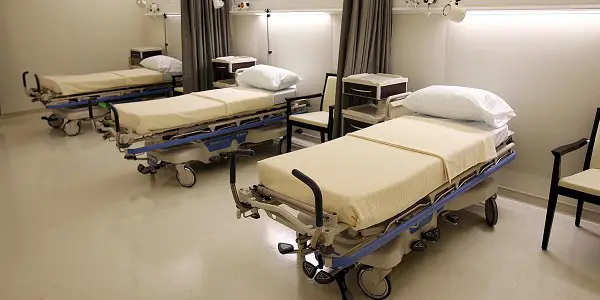Hospitals are being forced to cancel routine surgeries after a near 5,500 increase in the number of people attending A&E.
Cork University Hospital cancelled 30 operations on Thursday while Beaumont and the Mater in Dublin were also forced to limit scheduled theatre work due to exceptional demand.
The Health Service Executive (HSE) said some patients have experienced significant delays in emergency departments and in waiting for admission to a hospital bed.
It said managers have reports of a 10% increase in people going to A&E with Our Lady’s of Lourdes Drogheda up 21%, Connolly Hospital in Dublin and Cork University Hospital up 14% and Beaumont Hospital up 12%.
In the first 20 days of the year there have been 64,952 attendances at emergency departments, up 5,415 on the same period last year.
The HSE said there was a marked increase in the number of older people and this was a “particular significance”.
“These patients typically have a much higher requirement for admission,” the agency said.
The HSE also said flu like illness rates have quadrupled with hospitals reporting an increased prevalence of patients presenting with respiratory/flu like symptoms.
The Irish Nurses’ and Midwives’ Organisation (INMO) said its daily trolley watch report found 462 waiting in an A&E or in a corridor for a bed in a ward.
The HSE’s figures showed that at 8am 386 patients were on trolleys with 158 waiting for more than nine hours.
The hospitals worst affected by overcrowding in emergency units are Beaumont with 41 patients waiting on trolleys or chairs; St Vincent’s University Hospital with 33, Our Lady of Lourdes in Drogheda with 32; University Hospital Waterford with 32; and University Hospital Galway with 31.
With scores of procedures and surgeries postponed at several hospitals, the HSE said: “All affected patients have been contacted and informed that their appointments will be rescheduled as soon as possible.”
The agency urged people with non-urgent conditions to consider other options available to them before trying A&E units.
It highlighted treatment available in minor and local injury units including the Rapid Access Clinic in Smithfield, Dublin; Mercy Urgent Care Centre, Gurranabraher, Cork; and the Minor Injury Unit at Louth County Hospital, Dundalk.
The Irish Medical Organisation (IMO) said the cancellation of operations will not solve overcrowding.
Dr Ray Walley, IMO president, said: “It is a shameful situation.
“The root of the problem lies in the lack of capacity in the system as a whole and until that is addressed the problem will reoccur with cancellation of elective surgery becoming routine.”
The IMO said overstretched GPs will not feel the knock-on effect of people not being seen in hospitals.
It said A&E overcrowding has dogged hospitals for a considerable length of time but no positive long-term steps have been taken to address the issue.
The IMO called for 1,600 beds taken out of the acute hospital system to be reinstated, more i nvestment in GP services, new beds for nursing homes and rehabilitative settings with suitable home care supports, and measures to retain doctors and bring home Irish trained doctors.
Dr Walley said: “Ireland is now at the start of a curve of a rapidly increasing ageing population and our health services are simply unable to cope.
“The ED (emergency departments) crisis is a result of conscious choices taken by ministers and health administrators and its solution will come about when different choices are made.
“In the coming election every political party must be challenged as to whether they believe that recurring crises like these are acceptable to us as a society.”
